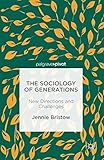The Sociology of Generations [electronic resource] : New Directions and Challenges / by Jennie Bristow.
By: Bristow, Jennie .
.
Contributor(s): SpringerLink (Online service) .
.
Material type:  TextPublisher: London : Palgrave Macmillan UK (Imprint), 2016Description: X, 125 p. online resource.ISBN: 9781137601360 (ebook: PDF).Subject(s): Demography
TextPublisher: London : Palgrave Macmillan UK (Imprint), 2016Description: X, 125 p. online resource.ISBN: 9781137601360 (ebook: PDF).Subject(s): Demography| Item type | Current location | Call number | Status | Date due | Barcode |
|---|---|---|---|---|---|
| National Library of India | Available | NLI-EBK000028575ENG |
1.Why study generations? -- 2. Fresh contacts, education, and the cultural heritage -- 3. Teachers, the end of ideology, and the pace of change -- 4. 'Safeguarding', child protection and implicit knowledge -- 5. Gender and the intimate politics of reproduction -- 6. Conclusion.
This book suggests that the enduring problem of generations remains that of knowledge: how society conceptualises the relationship between past, present and future, and the ways in which this is transmitted by adults to the young. Reflecting on Mannheim's seminal essay 'The Problem of Generations', the author explores why generations have become a focus for academic interest and policy developments today. Bristow argues that developments in education, teaching and parenting culture seek to resolve tensions of our present-day risk society through imposing an artificial distance between the generations. Bristow's book will be of interest to students and scholars in the fields of Sociology, Social Policy, Education, Family studies, Gerontology and Youth studies. .
 Government of India
Government of India
 Recognizing the ongoing need to position itself for the digital future, Indian Culture is an initiative by the Ministry of Culture. A platform that hosts data of cultural relevance from various repositories and institutions all over India.
Recognizing the ongoing need to position itself for the digital future, Indian Culture is an initiative by the Ministry of Culture. A platform that hosts data of cultural relevance from various repositories and institutions all over India.
